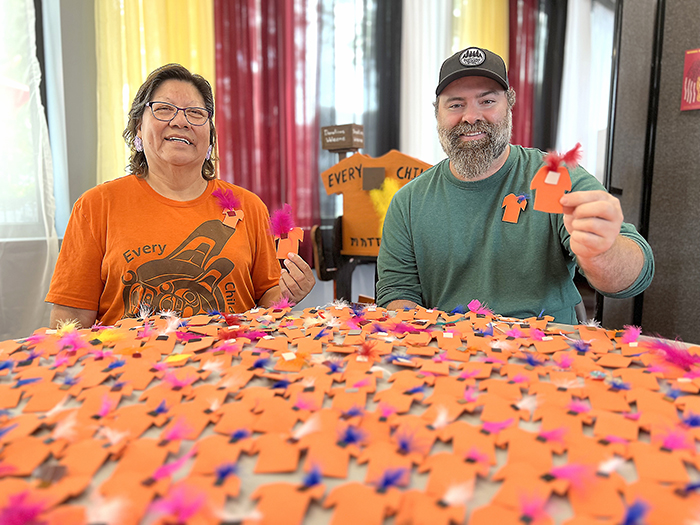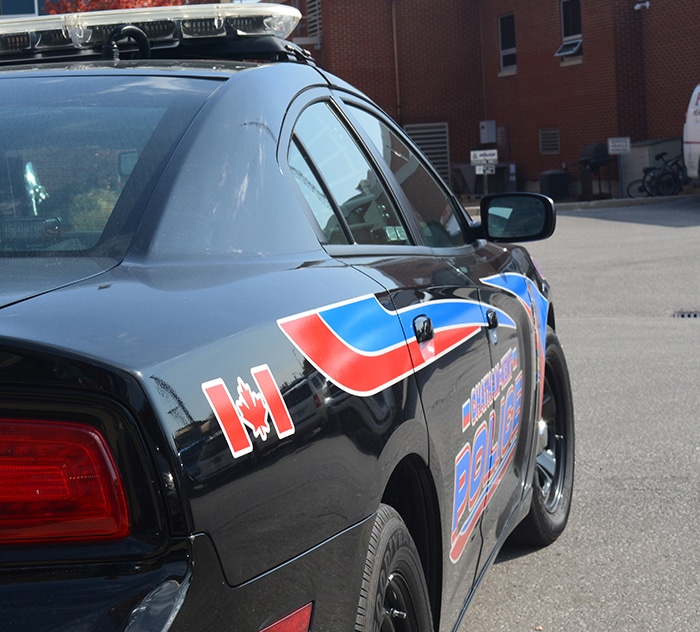
By Pam Wright
Local Journalism Initiative Reporter
A total of 150,000 and counting.
That’s how many tiny Takwihleew orange shirt pins have been created to commemorate the lives of Indigenous children who perished or were harmed in Canada’s residential schools.
The idea was conceived by Lana Parenteau of the Lunaapeew People of Delaware Nation at Moraviantown. When the Sixties’ Scoop survivor heard about the discovery of 215 children’s bodies at the former Kamloops Indian residential school in 2021, it hit her hard.
Parenteau came up with the idea of the pins with her granddaughter Sky. Together at the kitchen table, the pair made 30 pins, with 15 going to the United Way of Chatham-Kent, and 15 to Family Service Kent.
The rest as they say is history, with hundreds of community members, schools and businesses pitching in to make the shirt pins. The small orange emblems are decorated with feathers and a small piece of moosehide that represents Indigenous men and boys standing up against violence towards women and children.
Parenteau said the pins start conversations and raise awareness. She’s led dozens of workshops about the pins, both in person and virtually, with the movement expanding to Montreal, Calgary and Ottawa. Thanks to a collaboration with Come Together CK, pin kits with all the materials have been created for those who want to show their support. An estimated 10,000 people have participated in making the pins.
Takwihleew means “come together” in the Lenape language.
While Orange Shirt Day was originally created to mark National Truth and Reconciliation Day on Sept. 30, beginning in B.C. in 2013, the idea gained momentum following the discovery in Kamloops.
Like the children themselves, Parenteau said each pin is unique.
“There’s no right way or wrong way to make them,” she explained. “So many ideas have poured in and everybody’s idea is their own.”
It’s Parenteau’s hope that Canada’s Orange Shirt Day, which carries the motto “Every Child Matters” becomes a year-round movement.
“I think it’s important it’s not just one day a year,” Parenteau said. “We all share the work of truth and reconciliation together. It’s our history, our learning, our healing.”
The cultural genocide perpetrated by the government affected Parenteau’s life deeply. Her mother went to an Indian Residential School in Mount Elgin, and her brothers went to the Mohawk Residential School in Brantford.
As a child, she was adopted by a white family, but ran away and was homeless and addicted on the streets of Vancouver. But Parenteau recovered and now uses her experience to help others.
She was hired at Chatham-Kent’s first Indigenous Peer Navigator two-and-a-half years ago, but funding for the position ran out in March of this year. That hasn’t stopped her work with others.
Brent Wilken, executive director of Come Together CK, said the reason behind the success of the project is “Lana’s openness.
“So many people have become a part of it because they feel comfortable,” Wilken said. “They feel they can help make a change.”
The Truth and Reconciliation Movement in Chatham-Kent continues with the sale of Every Child Matters T-shirts, with profits going to programs for Indigenous children and youth. Booths distributing pins will also be set up at various businesses, including one at Walmart on Sept. 28.
Despite the ongoing publicity about Canada’s Orange Shirt Day, Parenteau said some people still don’t know about the impact of residential schools and she hopes the pins will continue to raise awareness about the issue.





